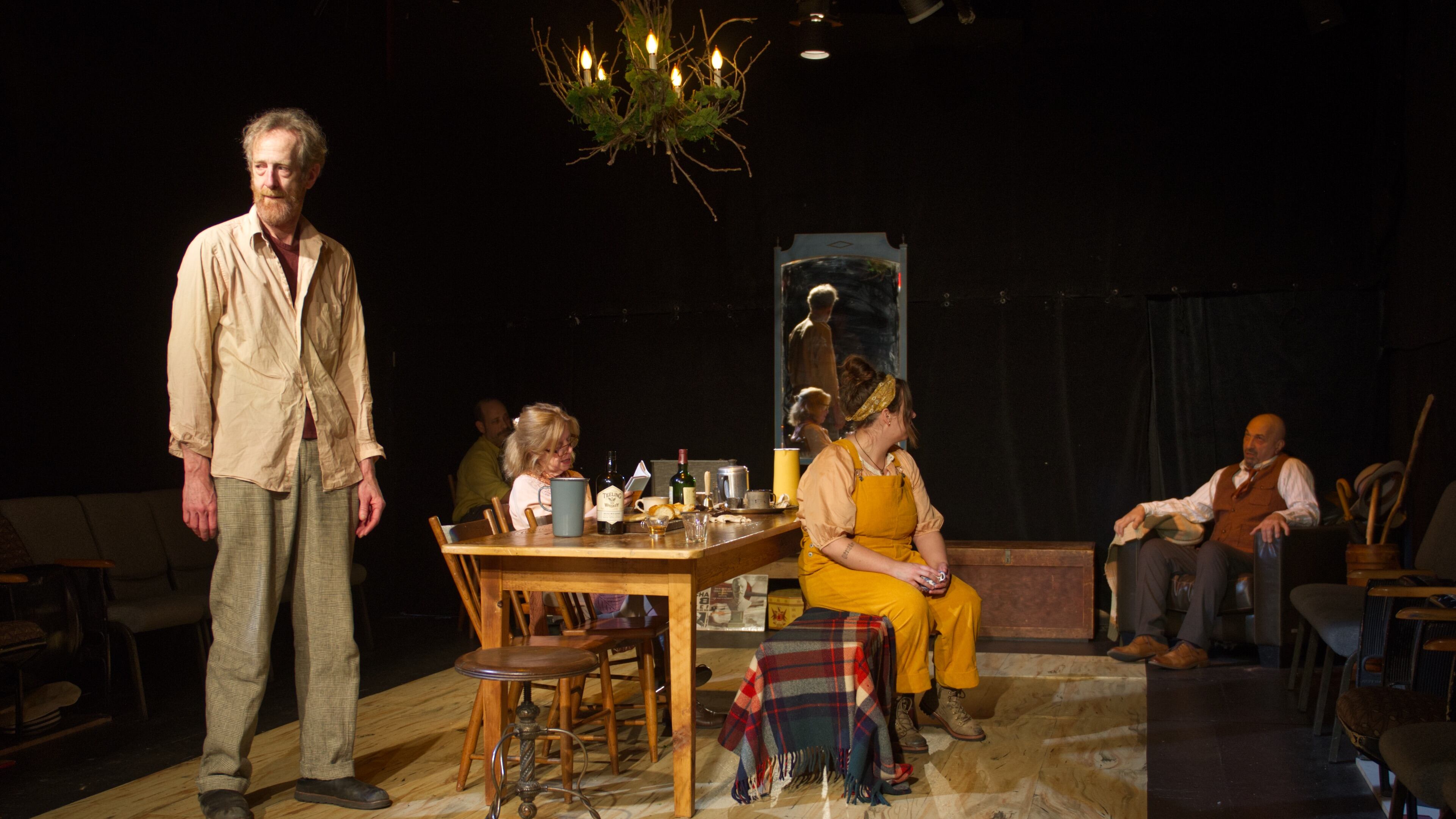In 21ten Theatre’s earthy and emotional Uncle Vanya, directed by Chris Conner, a young woman named Sonya (Hailey Houser) calls herself ugly. “I know I am,” she says before slowly turning to look at the audience.
The moment is so affecting that some theatergoers might feel impelled to leap up and throw their arms around Houser. If so, they wouldn’t have far to go because all the seats that wrap around the farmhouse set are just a breath away from the actors—a brilliant staging choice that makes Anton Chekhov’s 1897 script as immediate as the dramas that take place in our own homes.
In the play, Sonya’s father, Alexander (Doren Elias), and his glittering young wife, Yelena (Angie Tennant), are visiting his country estate, which Vanya (Ted Rooney) and Sonya, his niece, have dedicated their lives to managing. While Yelena stirs sexual longing in Vanya and his friend Astrov (Joseph Bertόt), Alexander is a retired professor whose romantic and professional success sparks irritation and jealousy in Vanya.
As relatable as these feelings are, 21ten’s adaptation of Štěpán Šimek’s translation narrows the distance even more between modern audiences and the 100-year-old Russian play by folding in contemporary touches. Among the props are the ailing professor’s plastic pill bottles as well as a turntable and records. In this context, we’re not surprised to hear Astrov sing Tom Waits’ “I Hope That I Don’t Fall in Love With You’' or see the hardworking Sonya wearing Carhartt-style overalls. The language, too, has a contemporary flavor. Astrov refers to himself as a “treehugger,” and Vanya’s barrage of f-bombs are commonplace to 21st century ears.
It’s a delight to see Rooney, who is 21ten’s artistic director, cut loose from his close-lipped portrayal of Morey on Gilmore Girls to create a character that fills the theater with the electricity of his emotions. Adept at physical comedy, Rooney highlights both the humor and the pathos of Vanya’s bitterness, especially when he mocks Alexander by flapping his arms and squawking like a peacock, expressing his goofy but visceral animosity for the man who was once married to Vanya’s late sister.
All the performers use smaller gestures, too, that bring out the nuances of their characters. At the kitchen table, Vanya’s mother (Kathleen Worley) touches Alexander’s arm with a tender reverence she never shows for her own son. For Sonya, it’s her eyes following Astrov’s easy movements that let us feel her longing…and the pain of knowing he doesn’t return it.
On the whole, women are more of a physical presence here than they could have been in the 1890s. Tennant lounges on the floor like a cat, then later sits on the table with her feet on a round piano stool that she rotates with her supple bare toes. There’s more to her than her sensuality, though. Shown in juxtaposition to all the other characters—dressed in earthy shades of ochre, peach, and brown—Yelena’s white crop top and crisp pleated trousers enthrall the males, but she’s also a smart woman living in a society that allows her to be either a sexual partner or a homey helpmate, and when she clutches her elegantly manicured hands, she reveals her awareness of how limited her options are.
Even Sonya’s former nursemaid, who mostly stays in the background, is a fleshed-out character, thanks to Jacqueline MacDonald’s warm portrayal. As Nanny, she laughs with Astrov but then later wears the distressed expression of a worried mother as tension builds between the characters. With the actors mostly in view even when they aren’t in a scene, the lines between us and them are blurred, adding emotional resonance to the story.
Without these updates, though, Uncle Vanya would still be shockingly current. Nowhere is this more evident than when Astrov delivers his passionate and poetic monologue on humanity’s thoughtless destruction of nature—a statement that could have been made by our own climate activists.
Like Chekhov, though, this devastating production doesn’t lecture or offer answers for modern audiences. Instead, it simply shows people who pulse with frustration. “How are we going to survive winter in this house?” Yelena asks—a question that anyone who’s been confined in recent years by a pandemic, ice storms, a heat dome or wildfire smoke is sure to understand.
SEE IT: Uncle Vanya plays at 21ten Theatre, 2110 SE 10th Ave., 21ten.org. 7:30 pm Thursday–Saturday and 2 pm Sunday, through May 26. $25-$30.
